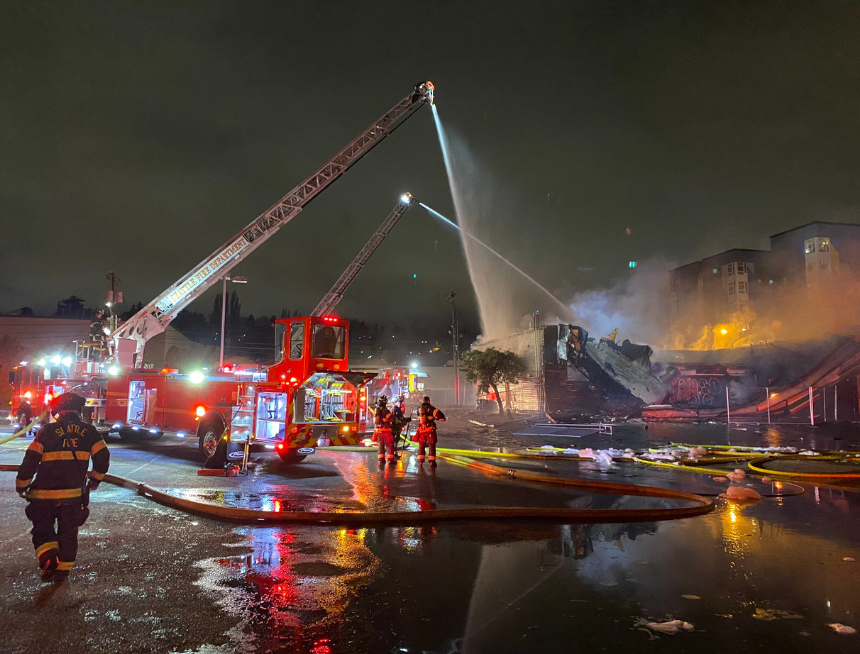The Seattle City Council unanimously passed legislation (6-0) today to protect firefighters and EMTs when they are responding to emergencies. The legislation closes a loophole that excluded them from the same protections given to many other city employees, including police officers.
The legislation was sponsored by Councilmember Lisa Herbold (District 1 – West Seattle) and Councilmember Andrew J. Lewis (District 7 – Pioneer Square to Magnolia). It was supported by the Seattle Fire Department and frontline firefighters from IAFF Local 27.
“When we have to delay our response because of threats, it can cause fires to increase in size or medical conditions to deteriorate. I want to thank the Mayor’s Office, the City Council and the community for their ongoing support of the Seattle Fire Department,” said Seattle Fire Department Chief Harold D. Scoggins.
Contents
- Why do Seattle Firefighters need legal protections?
- How does the Seattle City Council’s legislation aim to protect firefighters?
- How will enforcement of these firefighter protections work?
- What happens next?
Why do Seattle Firefighters need legal protections?
The Seattle Fire Department reports that attacks on Seattle firefighters and other interference are becoming a regular occurrence for EMTs and firefighters. Just over the past six months, there have been more than 50 attacks on Seattle firefighters, according to Kenny Stuart, a lieutenant for the Seattle Fire Department and president of the city’s firefighter union. That includes at least one scenario where Seattle firefighters were assaulted by someone throwing rocks at them.
“We are having increased trouble getting where we are being requested. This is not about self-dispatch. We’re being called in where we’re needed,” said Chris Lombard, Assistant Chief of the Seattle Fire Department.
The department told the Council that even after they get access to help people experiencing emergencies, chaotic scenes and the inability to create space for EMTs and firefighters can create distractions and unsafe environments for them to do their jobs.
How does the Seattle City Council’s legislation aim to protect firefighters?
The legislation will give firefighters the same protections from interference when responding to an emergency already granted that many other city employees, such as police officers. Those protections are codified under Seattle Municipal Code (SMC) 12A.16.010, which makes “obstructing a police officer” a gross misdemeanor.
Giving firefighters and police officers the same protections will also allow the Seattle Fire Department to work with the Seattle Police Department on “obstruction zones.” These are designed to give emergency responders adequate space to perform their duties, similar to the way police investigations of crime scenes work.
Importantly, the legislation recognizes the Constitutionally protected right of the public to observe and record the activities of police, firefighters, and others, as long as they are not intentionally interfering with the response. SMC 12A.16.010 also protects people from being charged with obstruction if “the public officer was not acting lawfully in a governmental function.”
How will enforcement of these firefighter protections work?
Under the legislation, people can be arrested and charged if they intentionally physically interfere with firefighters, EMTs, and other fire responders who are actively responding to an emergency. It would also prevent people from intentionally refusing to leave the scene of an investigation of a crime while an investigation is in progress after being requested to do so.
The Council approved three important amendments, sponsored by Councilmember Teresa Mosqueda (District 8 – Citywide), that provide safeguards for abuse of the legislation. Those amendments:
- Ensure people will not be charged for obstructing their own care, such as when they are revived by naloxone and may be disoriented and violent;
- Reinforce the expectation that police will consult with the Seattle Fire Department before engaging with people at the scene of a fire department emergency; and,
- Mandate that the legislation be evaluated under the Racial Equity Toolkit to make sure it’s not having unintended consequences, such as racially disparate charges.
What happens next?
The legislation now heads to Seattle Mayor Bruce Harrell. If he approves, the legislation will take effect 30 days after he signs it. If it’s not signed by the mayor within 10 days, then the new law will go into effect 30 days afterwards. Finally, he has the option to veto the legislation.


